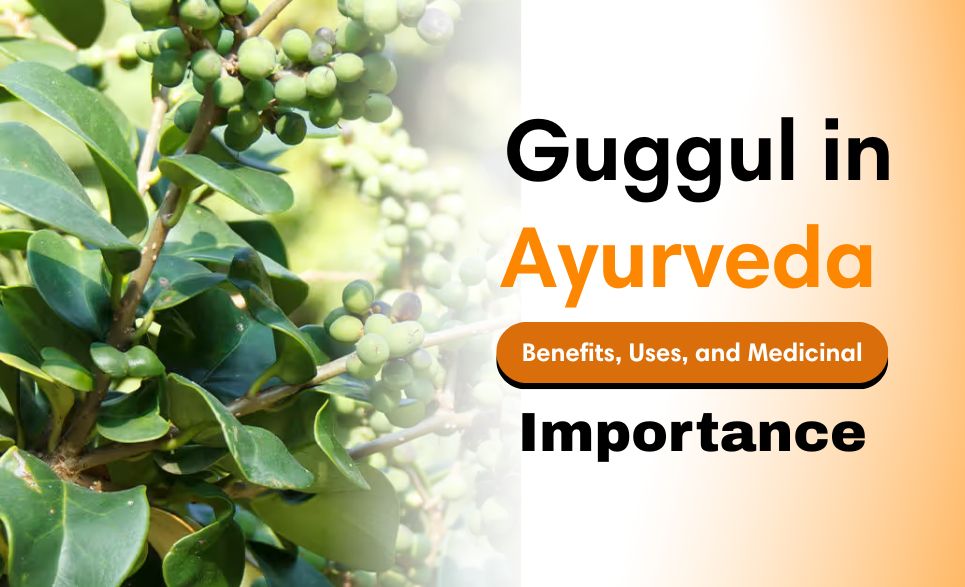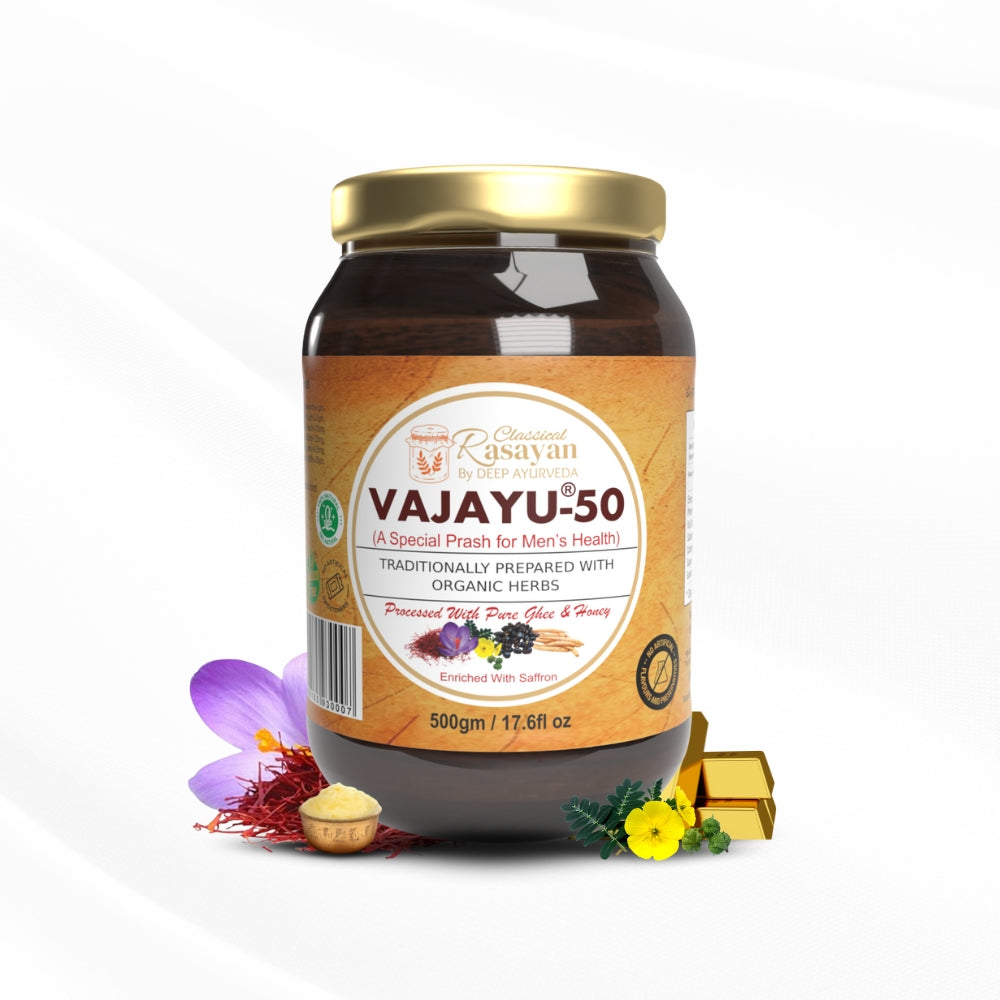समाचार
Guggul in Ayurveda: Benefits, Uses, and Medicinal Importance
Guggul, a resin extracted from the Commiphora mukul tree. This is a kind of small tree, grows up to 6 m with spiral, brown colored ascending branches ending in sharp scented spines. The Commiphora wightii or Guggulu is distributed in the rocky tracts of Gujarat, Rajasthan and Mysore in India, Sindh and Balochistan of Pakistan. Guggulu is a popular herb classified as tridosh har in Indian Ayurvedic medicine that is used to treat several ailments. Guggulu is a shrub or small tree belonging to Burseraceae family. It contains volatile oil, gum resin, gugulipids, guggulsterones, guggulsterols, mukolol and other steroids. Due to its miraculous healing properties, it has been used for centuries in India to treat a range of health conditions. Properties and actions- Guna of puran(old)guggulu: Laghu, Ruksh, Tikshna, Vishad, Suksham, Sar, Sugandhi Guna of Naveen(fresh) guggulu: Snigdh, Picshil Rasa: Katu, Tikta, Kasaya Vipaka: Katu Virya: Ushna Prabhav: Tridosh har Karma: Balya, Rasayana, Varnya, Vatabalasajit, Bhagnasandhanakrit, Medohara, Balances Vata and Kapha, may aggravate Pitta in excess Benefits of Guggul- 1. Weight Management & Fat Metabolism Guggulsterones, active compounds in guggul, help reduce LDL (bad cholesterol) and triglycerides while promoting HDL (good cholesterol).According to Ayurveda its Medohara (fat-reducing) property help in reducing cholesterol and increases fat metabolism by kaphshamak action. 2. Aids in Weight Management Guggul boosts metabolism and enhances fat burning(through medohar and kaphshamak action) by stimulating thyroid function. It is a key ingredient in Medohar Guggulu, traditionally used to reduce excess fat and manage obesity. 3. Anti-inflammatory & Pain Relief Guggul has Vaatshamak property that causes relief in arthritis, joint pain, and Kaphshamak property helps relieve muscle inflammation. 4.For Blood Purification and Acne Pimples- A Kapha-Pitta dosha skin type can be prone to acne and pimples. According to Ayurveda, an aggravation of Kapha increases sebum production which clogs the pores. This results in the formation of both white and blackheads. An aggravation of Pitta also causes red papules (bumps) and inflammation with pus. Guggul helps to balance Kapha-Pitta because of Tridosha balancing property and reduces clogs and inflammation when taken orally in the form of classical formulation Kaishor guggul . 5. Antioxidant & Anti-aging- Guggul delays cellular aging and supports longevity. It rejuvenates tissues and boosts overall vitality. 6. Bone and Joint Support- Promotes bone healing and strengthens joints. It is also used in degenerative disorders like osteoarthritis and cervical/lumbar spondylosis. 7.Balances Hormones and Supports Thyroid Function- Guggul is especially beneficial for hypothyroidism, guggul in classical formulation of Kanchnar guggul and Triphala guggul stimulates thyroid hormone production and supports hormonal balance, making it helpful in PCOS and menstrual disorders. 8.Balya & Rasayana- Guggul act as Strength-giving and rejuvenating dravya Classical Ayurvedic References of Guggul- "गुग्गुलुस्तिक्तका क्षौद्रा मधुरा त्रिदोषहा । रसायनी तीक्ष्णा शीघ्रव्यापिनी पाचनी ॥"— Bhavaprakasa Nighantu Guggulu is bitter in taste (tikta rasa) has honey-like sweetness ,Balances all three doshas (Vata, Pitta, Kapha),acts as a rejuvenator (Rasayana) ,sharp/potent in action ,spreads quickly through the body,enhances digestion (Deepana-Pachana). "गुग्गुलुस्तु महावीर्यो दोषान् हन्ति त्रयांश्च सः | वातपित्तकफघ्नश्च विशेषेणानिलापहः ||" Yogaratnakara – Vata Vyadhi Chikitsa Guggulu is of great potency, destroys all three doshas, with special emphasis on Vata alleviation—making it highly effective in neuromuscular and joint disorders. Guggul-Based Ayurvedic Classical Formulations- Yograj Guggulu – Joint and muscle pain Kaishor Guggulu – Skin disorders and blood purification Medohar Guggulu – Obesity and weight loss Kanchnar Guggulu – Thyroid and glandular swellings Triphala Guggulu – Detoxification and digestive support Amritadi Guggul-gout Abha Guggul-spondylitis Lakshadi Guggul-any type of bone fracture Conclusion- Guggul stands as a timeless Ayurvedic remedy, deeply revered for its tridosha-balancing, detoxifying, and rejuvenating properties. From managing cholesterol, weight, and joint pain to addressing skin disorders and hormonal imbalances, Guggul offers a holistic approach to wellness. Backed by classical Ayurvedic texts and centuries of traditional use, Guggul is not just a herb—it's a potent healer for today’s lifestyle disorders. Incorporating purified Guggul under the guidance of an Ayurvedic practitioner can be a safe and effective way to restore balance and vitality naturally.
Read moreसमाचार
5 Powerful Ayurvedic Remedies for Diabetes: Natural Blood Sugar Control
Managing diabetes naturally has gained popularity in recent years, and Ayurveda—India’s ancient system of medicine—offers time-tested solutions. With the rise in lifestyle-related disorders like type 2 diabetes, many are turning to Ayurvedic remedies for diabetes to stabilize blood sugar and improve overall well-being. In this blog, we’ll explore 5 effective Ayurvedic remedies for diabetes that are easy to incorporate into your daily routine. These remedies focus on balancing your body's doshas, especially Kapha and Vata, which are often linked to diabetes in Ayurveda. 1. Bitter Gourd (Karela Juice) One of the most effective natural diabetes treatments, Karela (Bitter Gourd) is known for its blood sugar-lowering properties. It contains polypeptide-p, a compound that mimics insulin and helps regulate glucose levels naturally. How to use: Drink 30–50 ml of fresh karela juice on an empty stomach every morning. Combine with a pinch of turmeric for enhanced benefits. 2. Fenugreek Seeds (Methi Dana) Rich in soluble fiber, fenugreek seeds help slow down carbohydrate digestion and sugar absorption, promoting better blood sugar control in Ayurveda. How to use: Soak 1 tablespoon of fenugreek seeds overnight in water. Drink the water and chew the seeds in the morning. 3. Amla (Indian Gooseberry) Packed with vitamin C and powerful antioxidants, amla is a rejuvenating fruit that helps strengthen the pancreas and regulate insulin production. How to use: Mix 1 teaspoon of Amla juice with ½ teaspoon of turmeric and consume daily. You can also take it in powdered form or as a part of Triphala churna. 4. Gudmar (Gymnema Sylvestre) Also known as the “sugar destroyer,” Gudmar helps reduce sugar cravings and regenerates pancreatic cells. It’s a staple in many Ayurvedic formulations for type 2 diabetes treatment. How to use: Take 300–400 mg of Gudmar extract daily after meals (consult an Ayurvedic practitioner for dosage). It’s also available in capsule or powder form. 5. Neem Leaves Known for its detoxifying and blood-purifying qualities, neem helps in reducing insulin resistance and supports natural blood sugar balance. How to use: Chew 4–5 fresh neem leaves every morning. Alternatively, neem powder or neem juice can be taken as supplements. Neem is often recommended in Ayurveda for blood sugar control, especially in combination with other herbs like turmeric and amla. Final Thoughts Ayurveda offers a holistic and sustainable approach to diabetes management by addressing the root cause and not just the symptoms. Along with these Ayurvedic remedies for diabetes, maintaining a balanced diet, regular exercise, stress management, and proper sleep are crucial for long-term wellness. If you're considering natural diabetes treatment, always consult with a qualified Ayurvedic practitioner to ensure the remedies are personalized and safe for your body type.
Read moreWhat is healthy sex? Understanding the Key to a Fulfilling and Healthy Sex Life
Healthy sex is more than physical intimacy—it's a harmonious balance of body, mind, and emotion. In this blog, discover how Ayurveda supports sexual wellness through ancient wisdom, emotional connection, and natural herbal supplements like Vajayu Prash, Naripanch Prash, and more.
Read moreTips for Kidney Stone Pain Management: Effective Ways to Get Relief Fast
Kidney stones can cause intense pain, but relief is possible with the right approach. Learn effective Ayurvedic and natural remedies for managing kidney stone pain, including hydration, heat therapy, gentle movement, and powerful herbs like Gokshura and Pashanbhed.
Read more





